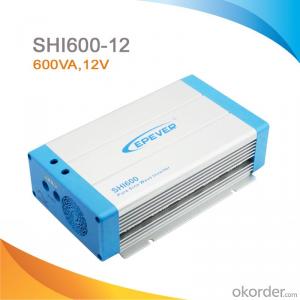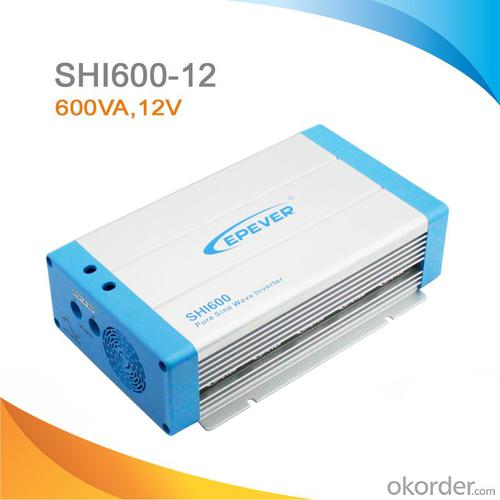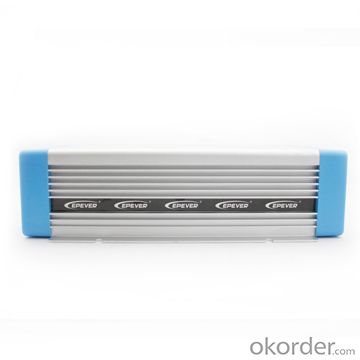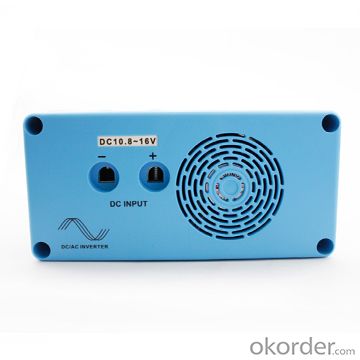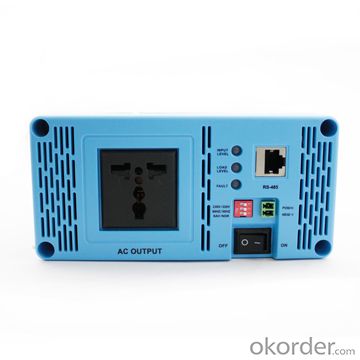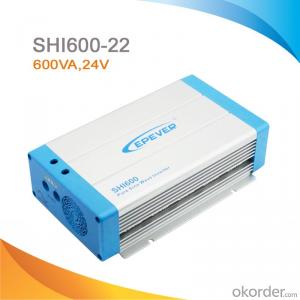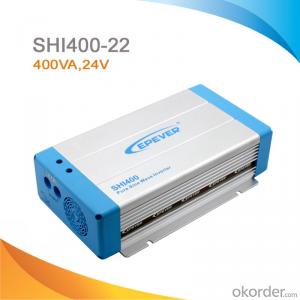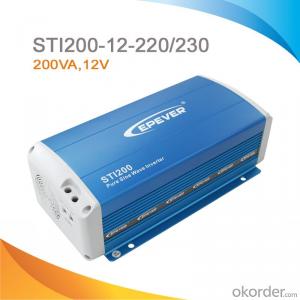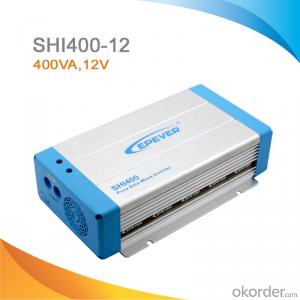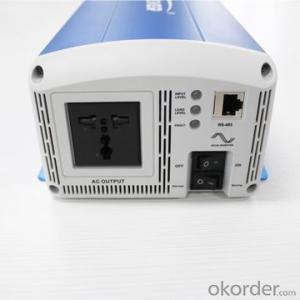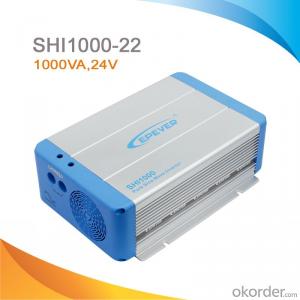20KW Solar Inverter - High Efficiency Off-Grid Pure Sine Wave PV Inverter 600W, DC 12V-AC 220V/230V, SHI600-12
- Loading Port:
- China Main Port
- Payment Terms:
- TT or LC
- Min Order Qty:
- -
- Supply Capability:
- -
OKorder Service Pledge
OKorder Financial Service
You Might Also Like
Description
SHI series is a pure sine wave inverter which can convert 12/24/48Vdc to 220/230Vac 50/60Hz based on full digital and intelligent design. It features high reliability, high efficiency, concise outline, small volume, easy installation and operation. The inverter can be applied in many fields, such as household appliances, electric tools and industrial devices etc, especially for solar photovoltaic power system.
Features:
·Input & output fully isolation
·Adoption of advanced SPWM technology, pure sine wave output
·Dynamic current loop control technology to ensure inverter reliable operation
·Wide DC input voltage range
·The output voltage and frequency can be switched
·Low output harmonic distortion(THD≤3%)
·LED indicators for input voltage range, load power range, normal output & failure state
·Optional energy saving mode
·Wide working temperature range (industrial level)
·Continuous operation at full power
Protections:
·Output short circuit protection
·Overload protection
·Input low voltage protection
·Input over voltage protection
·Overheating protection
·Inverter abnormal protection
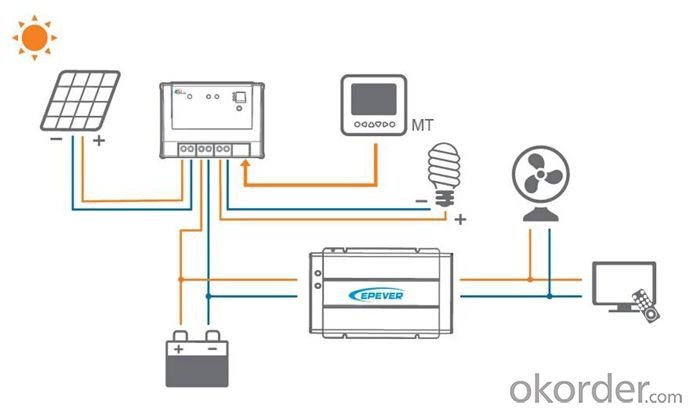
Specification:
Types | SHI600-12 | SHI600-22 |
Nominal Battery Voltage | 12V | 24V |
Input Voltage Range | 10.8~16Vdc | 21.6~32Vdc |
No Load Current | ≤0.7A | ≤0.45A |
Output Wave | Pure Sine Wave | |
Output Voltage | 220Vac±3% / 230Vac±10% | |
Continuous Power | 600W | |
Power 10 sec | 900W | |
Power 1.5 sec | 1200W | |
Surge Power | 1350W | |
Frequency | 50/60Hz±0.2% | |
Distortion THD | ≤ 3% (resistive load) | |
Efficiency at Rated Power | ≥91% | ≥92% |
Max. Efficiency | ≥93% | ≥94% |
Terminal | 25mm2 | |
Dimensions | 295×186×82mm | |
Installation | 150×178mm | |
Hole Size | Φ6mm | |
Net Weight | 2.3kg | |
Working Temperature | -20℃~ +50℃ | |
Storage Temperature | -35℃~ +70℃ | |
Humidity | < 95% (N.C.) | |
Altitude | < 5000m(Derating to operate according to IEC62040 at a height exceeding 1000m) | |
Insulation Resistance | Between DC input terminals and metal case: ≥550MΩ; Between AC output terminals and metal case: ≥550MΩ. | |
Dielectric Strength | Between DC input terminals and metal case: Test voltage AC1500V, 1 minute Between AC output terminals and metal case: Test voltage AC1500V, 1 minute | |
- Q: How does a solar inverter affect the overall system cost?
- A solar inverter can increase the overall system cost as it is a crucial component responsible for converting the DC electricity generated by solar panels into AC electricity for use in homes and businesses. The efficiency, capacity, and quality of the inverter can influence the system's performance and reliability. Higher-quality inverters with advanced features tend to be more expensive, but they can maximize energy production and improve system durability, potentially offsetting the initial cost through increased energy savings over time.
- Q: Why is a solar inverter necessary in a solar power system?
- A solar inverter is necessary in a solar power system because it converts the direct current (DC) produced by solar panels into alternating current (AC) that can be used to power household appliances and be fed back into the grid. Without a solar inverter, the DC power generated by solar panels would be incompatible with the electrical grid and unable to be utilized effectively.
- Q: What is the maximum power rating of a solar inverter?
- The maximum power rating of a solar inverter typically depends on its size and capacity, but it can range from a few hundred watts to several megawatts.
- Q: What is the role of a solar inverter in preventing system failures?
- The role of a solar inverter in preventing system failures is to convert the direct current (DC) produced by solar panels into alternating current (AC) that can be used to power electrical devices. By continuously monitoring the performance of the solar system and ensuring the optimal conversion of power, the inverter helps to prevent issues such as voltage fluctuations, overloading, and short circuits. It also provides vital protection by promptly detecting and responding to any faults or abnormalities in the system, thereby minimizing the risk of system failures and maximizing the overall efficiency and reliability of the solar power generation.
- Q: How does a solar inverter handle voltage fluctuations from the solar panels?
- A solar inverter handles voltage fluctuations from the solar panels by continuously monitoring the incoming voltage and adjusting its own output voltage accordingly. It employs a control mechanism that stabilizes the voltage to ensure compatibility with the utility grid or the connected appliances. This enables the solar inverter to efficiently convert the variable DC voltage from the solar panels into a stable AC voltage, maintaining a consistent and reliable power supply.
- Q: What are the signs of a faulty solar inverter?
- Some signs of a faulty solar inverter include a complete lack of power generation, inconsistent or fluctuating power output, error messages or fault codes displayed on the inverter, unusual or excessive noise coming from the inverter, and visual indicators such as flickering lights or abnormal behavior of connected devices.
- Q: What is the typical size and weight of a solar inverter?
- The typical size and weight of a solar inverter can vary depending on the capacity and type of the inverter. However, most residential solar inverters have dimensions ranging from around 12 x 8 x 5 inches and weigh between 20 to 40 pounds. Commercial or utility-scale inverters can be much larger and heavier, often weighing several hundred pounds and having larger dimensions.
- Q: How do you size a solar inverter for a solar power system?
- To size a solar inverter for a solar power system, you need to consider the maximum power output of your solar panels. Calculate the total wattage of your solar panels and choose an inverter with a capacity slightly larger than that. It is important to ensure that the inverter's capacity can handle the maximum power output of your solar panels to avoid any performance issues or damage to the system.
- Q: What is the role of a solar inverter in a solar panel system?
- The role of a solar inverter in a solar panel system is to convert the direct current (DC) electricity generated by the solar panels into alternating current (AC) electricity that can be used to power household appliances and be fed back into the electrical grid. It also ensures that the electricity produced by the solar panels is of the correct voltage and frequency for safe and efficient use in homes and businesses.
- Q: Can a solar inverter be used with a grid-interactive system?
- Yes, a solar inverter can be used with a grid-interactive system. In fact, a solar inverter is an essential component of a grid-interactive system as it converts the direct current (DC) electricity generated by solar panels into alternating current (AC) electricity that can be used by household appliances and fed back into the grid when there is excess energy. The inverter also helps manage the flow of electricity between the solar panels, battery storage (if present), and the grid to ensure efficient and reliable power supply.
Send your message to us
20KW Solar Inverter - High Efficiency Off-Grid Pure Sine Wave PV Inverter 600W, DC 12V-AC 220V/230V, SHI600-12
- Loading Port:
- China Main Port
- Payment Terms:
- TT or LC
- Min Order Qty:
- -
- Supply Capability:
- -
OKorder Service Pledge
OKorder Financial Service
Similar products
Hot products
Hot Searches
Related keywords
